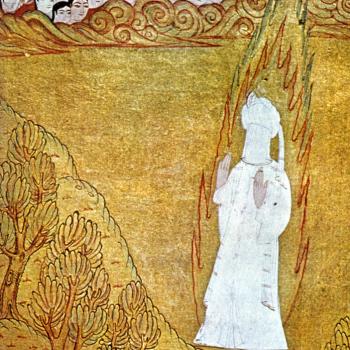Daliah Merzaban describes the taste of Love concealed beneath pangs of hunger
“Keep your body hungry,” was the advice a spiritual guide gave as a few friends and I embarked on a three-month fast earlier this year. In addition to Ramadan, we set the intention to fast during the two preceding months — Rajab and Sha’ban — as well.
In one way, it felt impossible; at first, I had to battle resistance even to say yes to the invitation. My mind was afraid of giving up my morning coffee during busy days at work. I worried how fasting might thwart a social life that was already constrained by pandemic lockdowns.
But in another, more visceral way, there was excitement at the prospect of traversing a trail I’d never journeyed before. I’ve always found fasting nourishing for my heart and body, but I never imagined fasting the equivalent of three Ramadans at once. I was curious to discover what lay ahead in this mysterious new land.
My teacher’s encouragement to keep our bodies hungry wasn’t necessarily about adhering to a strict set of “rules” as much as about pushing the limits of our hunger by listening carefully to our bodies. There’s wisdom concealed beneath pangs of hunger that isn’t audible when we rush to satiate cravings.
According to one tradition, Prophet Muhammad, peace and blessings be upon him, advised reserving a third of the stomach for food, a third for drink and a third for breath. With his wisdom in mind, I decided to have single small and nourishing meal each evening, thereby skipping the early-morning pre-fast meal called suhoor. I also cut out most sugar, which has been a crutch I have used to numb pain since childhood.
Some days, especially in the first month and a half, I was far from satisfied with the amount I’d eaten. I would succumb to overeating or late-night snacking. My body would end these days with a sense of uncomfortable fullness.
On other days, I was granted the strength to push through the cravings that arose. Instead of filling the craving, I would breathe air into my belly, imagining it was food. I allowed the hunger to be there, witnessing the discomfort as lovingly as I could. Eventually, the cravings would pass. My body would end these days with a sense of lightness and ease.

Weeks passed in this way and, gradually, what shifted for me was the ability to witness the promptings of hunger more objectively. I became better able to discern when a craving came from a habit/fear/desire to numb and when it arose from a true need for nutrients and replenishment. To reach this space meant journeying through painful memories and shame related to my weight and sense of unworthiness of love. As the grip of these patterns eased, how I responded to cravings became more of a choice than a habit.
By the time Ramadan came around, the cravings had mostly disappeared. I extended my fast to 22 hours on most days with minimal effort. My body felt energised, spacious and relaxed in a way I’d only glimpsed during previous Ramadans, but had never experienced so fully. I could almost hear my body breathe a giant sigh of relief. She was happy that I was finally empty for long enough to listen to her instructions — namely, to eat less frequently so she would have more time to process and digest what I had consumed.
During one meditation in the holy month, my teacher Camille Helminski reminded us that the original food of the human being “is the light of God.” I reflected on these lines one afternoon while sitting next to my plant Shamsa, a variety of Calathea native to the Brazilian rainforest. She is known as a “prayer plant” because in the early morning, she spreads out her broad leaves, as if in supplication, to catch the rays of the sun. Then, as the sun departs, she folds up her leaves like hands in prayer. How similar we are, I thought, eating Light and allowing this Light to guide us into a fuller expression of prayer.
In these moments of emptiness, I was also reminded of beloved Mary, mother of Jesus, seated in her prayer niche. According to the story related in the Quran, whenever Zachariah would visit Mary in her sanctuary, he would find her provided with food and would ask, “Oh Mary, from where did this come to you?” “She would answer: It is from God; see how God grants sustenance to whom He wills beyond all reckoning.”¹
I imagine the fruits beloved Mary was endowed with weren’t real but, rather, the invisible sweeter tasting ones Rumi alludes to in the poem, “Empty the Glass of Your Desire”:
If you close your mouth to food,
you can know a sweeter taste.
Our Host is no tyrant. We gather in a circle.
Sit down with us beyond the wheel of time.Here is the deal: give one life
and receive a hundred.²
Seekers on the Sufi path will know that our capacity for loving is veiled by many ego-driven tendencies, perhaps none more so than the tendency to numb ourselves with food. Stripping away ingrained veils of craving for 90 days, while at times incredibly uncomfortable, eventually transported me to a space where hunger ends and a fuller realisation of Love — and a deeper connection to Self — begins.
Which brings me back to the wisdom concealed beneath the pangs of hunger. For me, it was realising my body enjoys being empty. She needs long periods of rest each day in order to function at her best. It’s been three months since the fast, and most days I still refrain from eating for 17 hours, at least. Whenever I stray from this, my body simply does not feel as light, free and healthy.
The wisdom is so simple, yet a lifetime of being trapped in a three-meals-a-day mentality made it almost impossible to listen to my body’s unique needs. The long breaks from food have not only challenged my preconceived notions of what my body needs to survive, they’ve also resolved digestion issues like bloating and constipation I’ve suffered from most of my life.
These realisations have brought a deeper understanding of the Prophet’s words: “There is a tithe (zakat) for everything, and the tithe of the stomach is hunger.” As strange as it may sound, I love the sensation of hunger. Every tug of hunger feels like an invitation to sit for a moment in Muhammad’s radiant presence.
Mevlana says,
While your nature is purified through fasting
you’ll follow the footsteps of the purified through the universe.
With the burning of the fast, you will radiate like a candle.
but with the darkness of mouthfuls,
you’ll just be a morsel for the earth.³
End notes
1. Quran, Surah Al Imran, 3:37
2. Love is a Stranger, translated by Helminski, p. 74
3. Quatrains: 1929, translated by Helminski













